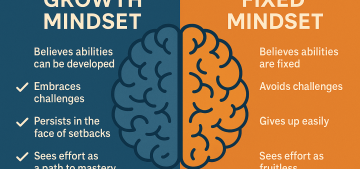Rethinking What It Means to Be Smart
For decades, society has measured intelligence through IQ tests, rewarding analytical ability, logic, and memory. But research now shows that being “smart” is no longer just about knowledge — it’s about understanding yourself and others.
This shift explains why the most successful leaders, communicators, and innovators don’t always have the highest IQs — they have high emotional intelligence (EQ).
Understanding Emotional Intelligence (EQ)
What Exactly Is Emotional Intelligence?
Emotional intelligence is the ability to recognize, understand, and manage your emotions — and influence others’ emotions effectively.
Coined by psychologists Peter Salovey and John Mayer, and popularized by Daniel Goleman, EQ bridges the gap between thought and feeling — the mind and the heart.

The 5 Core Components of EQ
According to Goleman’s model, EQ consists of five interconnected components:
1. Self-Awareness
Recognizing your emotional triggers and understanding how they affect your actions.
2. Self-Regulation
Managing impulses and staying calm under pressure. Emotionally intelligent people respond — they don’t react.
3. Motivation
An inner drive to achieve goals beyond external rewards. This creates long-term resilience and purpose.
4. Empathy
The capacity to understand and share others’ feelings — a cornerstone of trust and teamwork.
5. Social Skills
The ability to build strong relationships, resolve conflicts, and influence people positively.
IQ vs EQ: The Key Differences
| IQ (Intelligence Quotient) | EQ (Emotional Intelligence) |
|---|---|
| Measures cognitive ability | Measures emotional and social skills |
| Analytical thinking | Empathetic understanding |
| Focuses on logic and memory | Focuses on relationships and awareness |
| Helps solve problems | Helps manage people |
| Stable across life | Can be developed and improved |
When High IQ Isn’t Enough
A brilliant mind without emotional awareness can lead to poor communication, arrogance, or burnout.
In contrast, people with average IQs but strong EQ often excel in leadership, teamwork, and life satisfaction.

The Science Behind Emotional Intelligence
Daniel Goleman’s Groundbreaking Study
In his bestselling book Emotional Intelligence, Goleman found that EQ accounts for 90% of what sets top performers apart from average ones in leadership roles.
Brain Science: The Amygdala and Prefrontal Cortex Connection
EQ works through the interaction between the amygdala (emotions) and the prefrontal cortex (rational thinking).
When you manage stress and think before reacting, your brain literally rewires to improve control.
Why Emotional Intelligence Outweighs IQ in Real Life
Better Relationships and Communication
EQ helps people express themselves clearly and listen empathetically — the foundation of strong personal and professional bonds.
Leadership and Decision-Making
Leaders with high EQ build trust, inspire teams, and handle crises calmly — making better long-term decisions.
Conflict Resolution and Teamwork
EQ turns disagreements into dialogue, fostering collaboration and innovation.
Mental Health and Resilience
Emotionally intelligent individuals manage anxiety, bounce back from failures, and maintain optimism through adversity.
How to Develop Emotional Intelligence
Practice Self-Reflection and Mindfulness
Pause to observe your emotional triggers. Meditation and journaling improve emotional clarity.
Improve Listening Skills
Listen to understand, not to reply. Empathy starts with attention.
Seek Feedback from Others
Ask trusted peers or mentors how your emotions affect interactions. Growth begins with awareness.
Regulate Stress and Respond, Don’t React
Use breathing techniques or short breaks to regain control before responding emotionally.

Real-Life Examples of High EQ in Action
Leaders with High EQ: Oprah, Obama, and Satya Nadella
Oprah Winfrey connects deeply with audiences through empathy.
Barack Obama exemplifies calm under pressure and compassionate leadership.
Satya Nadella transformed Microsoft’s culture by promoting empathy and growth mindset.
These leaders prove that EQ builds not only careers but cultures.
Common Myths About Emotional Intelligence
“EQ is just being nice.”
False — it’s about managing emotions effectively, not suppressing them.“You’re born with EQ — you can’t learn it.”
Wrong — EQ grows through awareness, feedback, and practice.“High EQ means no conflict.”
Not true — it means handling conflict constructively.
FAQs About Emotional Intelligence
Q1: Is EQ more important than IQ in the workplace?
A: Yes, studies show EQ predicts job performance more accurately than IQ.
Q2: Can you measure your emotional intelligence?
A: Absolutely. There are self-assessment tools like the EQ-i 2.0.
Q3: Can introverts have high EQ?
A: Definitely. EQ is about awareness and empathy, not extroversion.
Q4: How does EQ affect relationships?
A: It enhances communication, empathy, and trust.
Q5: How can I improve my EQ fast?
A: Start by pausing before reacting — awareness is step one.
Conclusion: The Future Belongs to the Emotionally Intelligent
In a world where automation can replicate knowledge but not compassion, emotional intelligence is the new superpower.
EQ turns intelligence into impact — helping you connect, lead, and thrive.
The next time someone asks how smart you are, remember:
It’s not just about how much you know, but how well you understand yourself and others.





